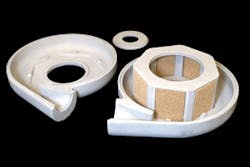Molten metal presents lots of problems for foundries and diecasters, including logistics, temperature control, and metallurgical quality, and there are no simple solutions to any of these. In fact, in most cases the solutions involve methods that are more-or-less customized to a particular operation. However, in terms of metal quality there are standards to be met, and according to the demands of the market there are filtration solutions.
For example, a centrifugal filter for large iron and steel castings has been introduced in recent months. In addition to specific chemical factors, the volume to be poured (thus, the size of the casting) has implications for ferrous metal quality. Foseco Metallurgical Inc., a manufacturer of proprietary consumables for molten metal filtration, has added a new product to its HOLLOTEX series of running and gating system components — HOLLOTEX Centrifugal Filter Units (CFU) — engineered for use exclusively in the production of large iron and steel castings.
The new product involves a refractory centrifuge system that separates contaminants from liquid metal and resists chemical erosion, and STELEX filters that remove contaminants from liquid metal and reduce turbulence in the gating system. Foseco reports that HOLLOTEX CFU products have been specifically designed to ensure consistent filter performance and to overcome the limitations involved with using multiple filter holders, such as inadequate filter support, unbalanced metal flow, velocity, and pressure and double inventory requirements for left and right spin units. Among the benefits of applying HOLLOTEX CFU products it lists a reduction in casting defects, rework and scrap; reduced machining allowances, cleaning and machining costs; castings that move through the cleaning room faster, reducing work in progress and shortening lead times; and better casting quality and consistency.
Another specific challenge for molten metal filtration is high-volume production — particularly for producers of high-value investment castings. Comanche Technologies identified that problem, noting that ceramic cellular/foam or silica-mesh filter cups usually require investment casters to accept trade-offs between optimal throughput, efficiency, and filtration efficacy.
Based on its study of the investment-casting market and its needs and preferences, Comanche developed a new filtration cup that it reports achieves high metal throughput with no decrease in filtration efficiency. The proprietary CerraFlex TorrentFlow™ Filter Cup incorporates a tailored zirconia refractory coating that effectively increases the working temperature threshold to a maximum of 3,500°F (1,927°C.) The supplier states that the refractory composition significantly enhances the rigidity and overall strength of the filter cup, providing the ability to handle increased pouring times and heavier metal flow. The TorrentFlow design also incorporates an interstitial space between the inner wall of the pouring cone and the outer edge of the filter cup that is custom-calculated for each cup and pouring cone pair, to deliver an effective filtration area increase of up to 78% over the traditional filter cup design.
In operation, the product also improves investment casters’ hot-topping performance and liquid impurity capture, and there is no need to preheat the filter (as with ceramic foam and cellular screen filters.) The pouring process for investment casting is simplified too, because there is no need for customized pouring cones.
If an aluminum metalcaster’s filtration challenge involves environmental compliance, SELEE Corp. can boast that its CS-X™ filter is the winner of the American Ceramic Society’s Corporate Environmental Achievement Award. The filter is a phosphate-bonded alumina (PBA) product offered as a drop-in replacement for the PBA ceramic foam filter, and formulated without phosphates and without refractory ceramic fibers. Removing the phosphates from the composition provides safety as well as environmental benefits. In certain conditions, PBA filters may react and release phosphine gas that, if inhaled, has adverse health effects.
SELEE developed the new filter after the phosphine gas risk was identified about five years ago. Since it was introduced in 2008 the CS-X™ filter has been widely adopted, with numerous testimonials to its advantages in metal quality, ergonomics, and cost, as well as environmental and safety conditions.
